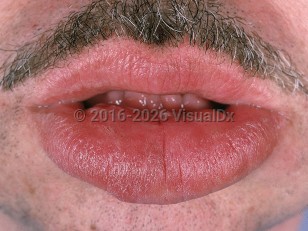Melkersson-Rosenthal syndrome - Oral Mucosal Lesion
Alerts and Notices
Important News & Links
Synopsis

Melkersson-Rosenthal syndrome is characterized by a triad of granulomatous cheilitis, facial palsy, and scrotal tongue. A characteristic finding of Melkersson-Rosenthal syndrome is swelling of orofacial mucous membranes and surrounding skin. The orofacial swelling most commonly involves the upper lip, followed by the lower lips and the circumoral and periorbital tissues. Most patients first develop intermittent asymptomatic swelling of the lips. Eventually, the swelling becomes persistent. Rarely, patients develop facial palsy first. Other associated neurologic and ophthalmologic symptoms include migraine headaches, tinnitus, dizziness, vision disturbances, and excessive tearing. Involvement of the facial nerve by granulomas is what leads to facial nerve palsy. Facial nerve palsy is usually unilateral, but bilateral involvement has also been reported.
The syndrome may be idiopathic, but evaluation for systemic disease is warranted as orofacial granulomatosis may be a presenting sign for underlying conditions such as Crohn disease or sarcoidosis. Granulomatous cheilitis may also be associated with hypersensitivity to some foods and food additives (in particular benzoates and cinnamon products), or sensitivities to amalgam. If no specific etiology can be identified (eg, after patch testing or evaluation for systemic disease), the condition is deemed idiopathic. However, orofacial granulomatosis may be the first manifestation of Crohn disease, with gastrointestinal signs and symptoms occurring years later.
Orofacial granulomatosis typically presents in the late second decade but has been reported in children as young as 5 years. No predilection has been shown for sex or race and ethnicity.
The syndrome may be idiopathic, but evaluation for systemic disease is warranted as orofacial granulomatosis may be a presenting sign for underlying conditions such as Crohn disease or sarcoidosis. Granulomatous cheilitis may also be associated with hypersensitivity to some foods and food additives (in particular benzoates and cinnamon products), or sensitivities to amalgam. If no specific etiology can be identified (eg, after patch testing or evaluation for systemic disease), the condition is deemed idiopathic. However, orofacial granulomatosis may be the first manifestation of Crohn disease, with gastrointestinal signs and symptoms occurring years later.
Orofacial granulomatosis typically presents in the late second decade but has been reported in children as young as 5 years. No predilection has been shown for sex or race and ethnicity.
Codes
ICD10CM:
G51.2 – Melkersson's syndrome
SNOMEDCT:
37770007 – Melkersson-Rosenthal syndrome
G51.2 – Melkersson's syndrome
SNOMEDCT:
37770007 – Melkersson-Rosenthal syndrome
Look For
Subscription Required
Diagnostic Pearls
Subscription Required
Differential Diagnosis & Pitfalls

To perform a comparison, select diagnoses from the classic differential
Subscription Required
Best Tests
Subscription Required
Management Pearls
Subscription Required
Therapy
Subscription Required
References
Subscription Required
Last Reviewed:09/23/2023
Last Updated:10/01/2023
Last Updated:10/01/2023
Melkersson-Rosenthal syndrome - Oral Mucosal Lesion

